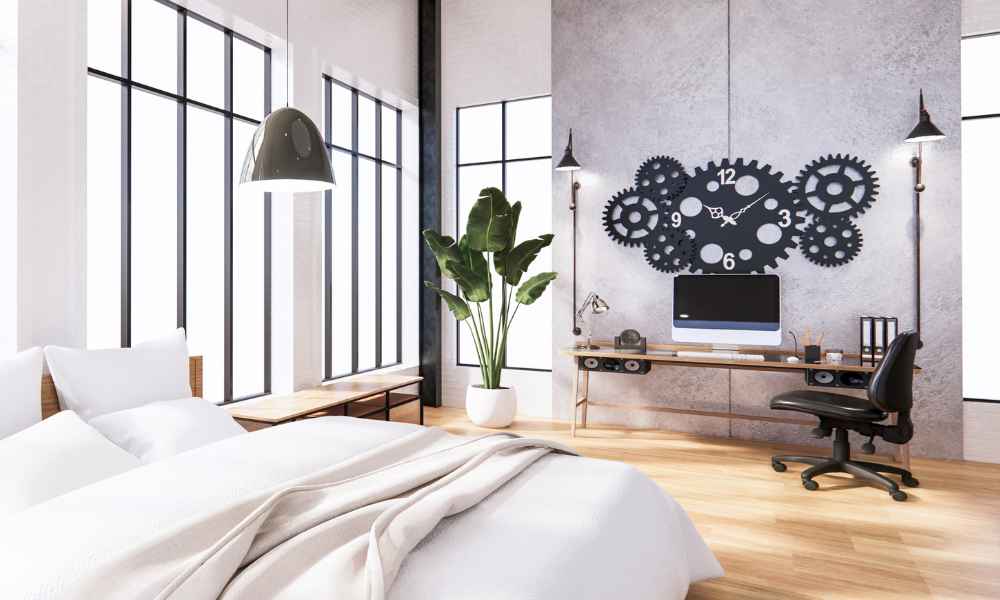Feng Shui, an ancient Chinese practice, is centered around the idea of creating harmonious environments that promote balance and positive energy flow. It encompasses various principles and guidelines for arranging spaces to enhance overall well-being and prosperity. One crucial aspect of Feng Shui is the placement of furniture and objects within a space, including the positioning of a desk in a bedroom.
Understanding the Importance of Desk Placement
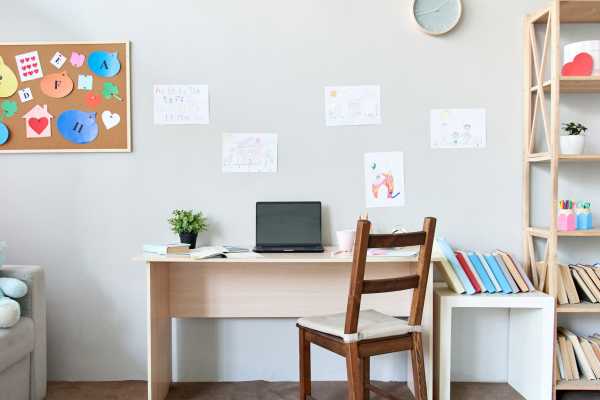
In Feng Shui philosophy, the placement of a desk holds significant importance as it directly impacts the energy, or “chi,” within a room. A well-positioned it can foster focus, productivity, and creativity, while a poorly placed one may disrupt the flow of energy and hinder these aspects. Thus, understanding the principles of desk placement can lead to a more conducive and harmonious workspace within the bedroom.
Basic Principles of Feng Shui Desk Placement
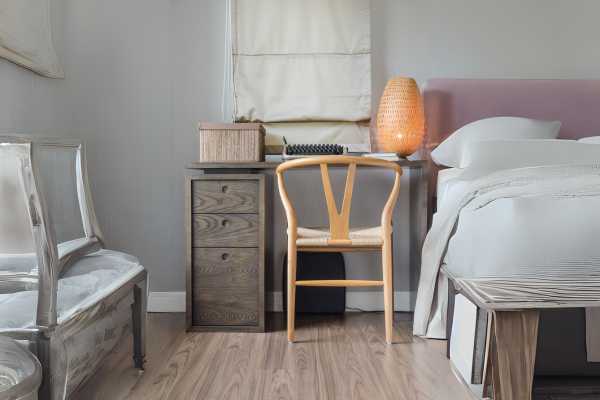
One of the fundamental principles of Feng Shui desk placement is the orientation of the desk within the room. Ideally, the desk should be positioned to allow for a clear view of the door without being directly in line with it. This arrangement symbolizes empowerment and control over one’s surroundings while still maintaining a sense of security and support.
Orientation of the Desk
When placing the desk in the bedroom, consider the orientation relative to the cardinal directions. According to Feng Shui principles, positioning the desk facing east or southeast is often recommended, as these directions are associated with vitality, growth, and inspiration. This orientation encourages a flow of positive energy and supports productivity and mental clarity.
Positioning with the Door
In Feng Shui, the relationship between the desk and the bedroom door is crucial. Avoid placing the desk directly in line with the door, as this position is believed to disrupt the flow of energy and create a sense of vulnerability or distraction. Instead, position the desk diagonally across from the door or along a wall perpendicular to it to promote a sense of stability and focus.
Best and Worst Desk Positions in a Bedroom
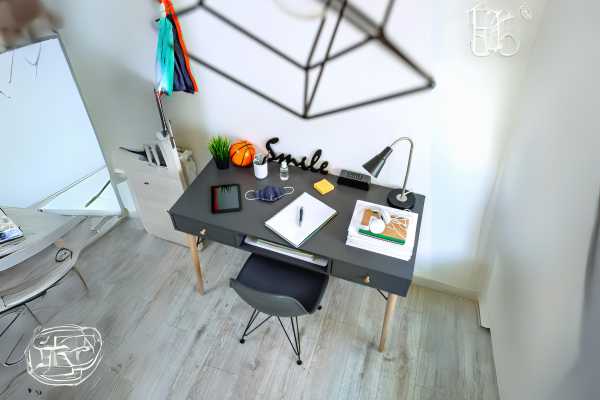
Arranging a desk in a bedroom according to Feng Shui principles, understanding the best and worst positions can significantly impact the flow of energy and productivity in the space. The most favorable position, known as the “command position,” involves placing the desk diagonally across from the door. This arrangement allows the occupant to have a clear view of the room while seated, promoting a sense of control and security without directly facing the door.
One of the worst positions in a bedroom is facing the door directly. This arrangement is believed to create a sense of unease or vulnerability, as the occupant may feel exposed to incoming energy or distractions. Instead, positioning the desk so it’s not in direct alignment with the door can help maintain a sense of stability and focus.
Specific Considerations for Desk Placement

In addition to the general guidelines, specific considerations for that placement include the relationship with the bed and achieving elemental balance within the room. The desk should ideally be positioned so it doesn’t directly face the bed, as this can create conflicting energies between work and rest areas. Additionally, incorporating elements of wood, metal, earth, water, and fire in the decor can promote harmony and balance. The relationship between the desk and the bed is crucial for maintaining a harmonious environment. Placing the desk at a distance from the bed, preferably on a different wall, helps delineate the boundaries between work and relaxation zones. This separation supports mental clarity and quality sleep, contributing to overall well-being.
Achieving elemental balance within the bedroom is essential for promoting positive energy flow. Integrating elements such as wood (represented by plants or wooden furniture), metal (such as metal accents or decorative items), earth (earth-toned decor or natural materials), water (artwork depicting water or actual water features), and fire (warm colors or candlelight) can create a harmonious environment conducive to productivity and creativity.
Core Principles of Feng Shui for Desk Placement
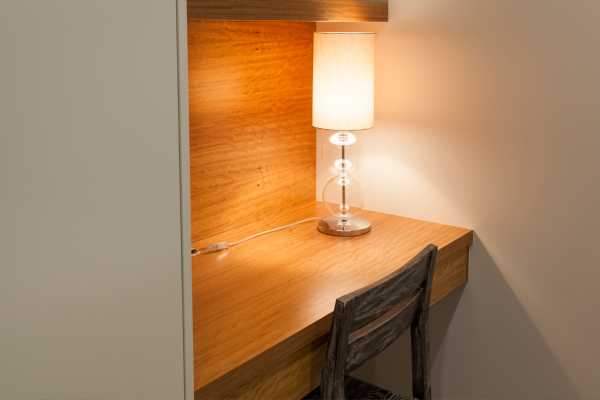
Several core principles guide optimal placement for promoting positive energy flow and productivity. One of the foundational principles is the concept of the command position. This entails placing the desk in a position where the occupant has a clear view of the room while seated, without being directly in line with the door. The command position fosters a sense of empowerment and control, enhancing focus and productivity.
Direct alignment with the bedroom door is generally considered unfavorable in Feng Shui, as it may lead to a sense of vulnerability or distraction. Instead, positioning the desk so it’s not directly facing the door but still allows for a clear view of the room promotes a more conducive work environment. The Barua Map, a tool used in Feng Shui to analyze the energy flow within a space, can also inform its placement in the bedroom. By aligning the desk with specific areas of the Barua Map related to career, knowledge, or creativity, you can enhance the corresponding aspects of your life.
Practical Tips for Desk Placement in a Bedroom According to Feng Shui

In addition to understanding the core principles of Feng Shui, practical tips can further optimize that placement in the bedroom to maximize positive energy flow and productivity. Ideally, the desk should be placed in a location that allows for ample natural light and good airflow, as these elements contribute to a sense of vitality and well-being. Positioning the desk near a window, but not directly facing it, can harness natural light while minimizing distractions.
In smaller bedrooms where space is limited, creative solutions for placement can still adhere to principles. Consider incorporating multifunctional furniture or utilizing wall-mounted desks to maximize floor space while maintaining a harmonious layout. Integrating natural elements into the workspace, such as plants or wooden accents, can enhance the connection to nature and promote a sense of calm and rejuvenation. These elements contribute to a balanced and harmonious environment conducive to focus and creativity.
Challenges and Solutions:

Various challenges may arise, but there are practical solutions to address them. Limited space in the bedroom can pose a challenge when it comes to placement. In such cases, consider opting for a compact it or a wall-mounted desk to maximize floor space. Additionally, utilizing multifunctional furniture or incorporating storage solutions can help create a functional workspace without overcrowding the room.
In shared bedrooms, accommodating multiple occupants’ needs and preferences can complicate placement. To address this, communicate openly with roommates or partners to find a mutually agreeable solution. This might involve positioning the desk in a corner or against a wall to minimize disruption and create individual work zones within the shared space.
The Impact of Proper Desk Placement on Productivity and Well-being
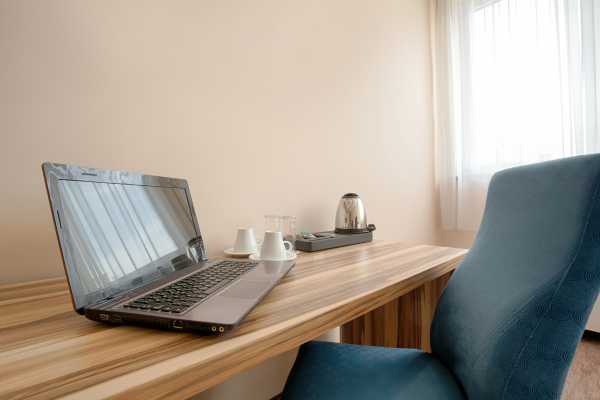
Proper placement in the bedroom according to principles can have a significant impact on both productivity and overall well-being. By positioning the desk in alignment with Feng Shui principles, you can enhance focus and creativity in your workspace. The command position and avoidance of direct alignment with the door promote a sense of control and security, allowing you to concentrate better on the tasks at hand and tap into your creative potential.
In addition to enhancing productivity, proper placement can also contribute to restful sleep. By creating a clear boundary between work and rest areas and avoiding clutter around the desk. You can cultivate a tranquil bedroom environment conducive to relaxation and quality sleep.
Tips for Optimizing Desk Placement

To optimize desk placement in the bedroom according to principles, consider incorporating the following tips: Feng Shui cures, such as mirrors, crystals, or wind chimes. Can be strategically placed to enhance positive energy flow and address specific challenges in the workspace. Experiment with different cures to find what works best for your unique needs and preferences.
Consulting your personal energy map, or BaZi chart, can provide valuable insights into your energy patterns and preferences. Use this information to tailor placement and decor choices to align with your energy for optimal results. Integrating natural elements, such as plants, natural materials, or water features. Can further enhance the positive energy flow in your workspace. These elements not only add visual appeal but also contribute to a sense of harmony and well-being.
What if my room layout doesn’t allow for the ideal desk placement?
If your room layout doesn’t allow for the ideal placement according to Feng Shui principles. There are still strategies you can employ to optimize the energy flow and functionality of your workspace. Consider placing it in the best available position that aligns as closely as possible with guidelines. Such as positioning it diagonally across from the door to achieve the command position. You can also use room dividers or furniture arrangements to create a designated work area within the bedroom. Even if it’s not in the most ideal location.
Can I place my desk near a window according to Feng Shui?
Placing your desk near a window in the bedroom can be compatible with principles if done mindfully. While natural light and a view can be beneficial for productivity and well-being. It’s essential to avoid placing it directly facing the window, as this may lead to distractions and fluctuations in energy flow. Instead, position it perpendicular to the window or at an angle that allows you to benefit from natural light without being overwhelmed by outside stimuli. Additionally, consider using window treatments such as curtains or blinds to regulate light and maintain a sense of privacy and focus.
How does desk color impact Feng Shui?
The color of your desk can have a significant impact on the energy of your workspace according to principles. Different colors evoke varying emotions and energies. So it’s essential to choose a color that aligns with your intentions and the desired atmosphere of the room. For example, neutral colors like white, beige, or light gray can promote a sense of clarity and purity. While earthy tones such as brown or green can foster stability and growth. Avoid overly stimulating colors like bright red or orange, as they may lead to feelings of agitation or restlessness. Ultimately, selecting a color that resonates with you and complements the overall decor scheme can contribute to a harmonious and balanced environment conducive to productivity and well-being.
Is it bad for Feng Shui to work from bed?
Working from bed is generally considered bad Feng Shui for several reasons. From a practical standpoint, it can lead to poor posture and discomfort. As beds are not designed for prolonged sitting or working. Additionally, mixing work and rest areas can blur boundaries and disrupt the energy balance in the bedroom. From a perspective, the bed is associated with rest, relaxation, and intimacy, while the desk symbolizes productivity and activity. Combining these conflicting energies in the same space can create imbalance and hinder both work performance and quality sleep. It’s advisable to designate a separate workspace away from the bed to maintain a clear distinction between work and rest areas and promote a healthy energy flow in the bedroom.
How can I improve the Feng Shui of my desk area if I have limited options?
If you have limited options for placement in your bedroom, there are still several ways to improve the Feng Shui of your workspace. Start by optimizing the available space to create a designated work area that is separate from the rest of the room. Utilize furniture arrangements, room dividers, or creative storage solutions to define the workspace and minimize distractions. Pay attention to the positioning of the desk relative to the door and windows. Aiming for the command position and avoiding direct alignment with the door. Incorporate cures and elements such as plants, crystals, or artwork to enhance positive energy flow and create a harmonious atmosphere. Finally, maintain a clutter-free and organized area to promote clarity, focus, and productivity.
Conclusion
Determining where to put a desk in the bedroom according to principles requires careful consideration of various factors. Including room layout, personal preferences, and energy flow. While it may not always be possible to achieve the ideal placement, there are practical steps you can take to optimize the Feng Shui of your workspace and create a conducive environment for productivity and well-being. By understanding the principles of placement. By making mindful adjustments to your workspace. And incorporating elements that promote positive energy flow, you can cultivate a harmonious and inspiring work area in your bedroom.
